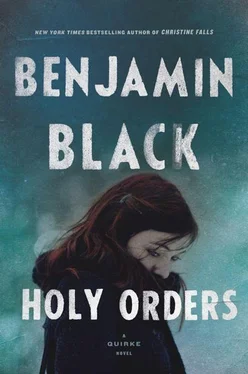Without his realizing it, his hand must have tightened on the soft flesh above Isabel’s hip, for suddenly she started awake and tried to sit up, leaning on an elbow. “What?” she said sharply. “What is it?” He touched his fingers to her face soothingly, cupped her cheek in his palm, and said it was all right. She lay down again slowly on her side, facing him now. “I was dreaming,” she murmured. She was staring into the darkness, he could see the glint of her eyes in the moonlight. “Something about my — something about my father. He was crying.” She moved forward, pressing her face against his shoulder. He reached past her and switched on the bedside lamp. Isabel whimpered in protest and clung the more tightly to him. He scrabbled for his cigarettes, found them, lit one. Isabel drew back, sighing. “Where’s my slip?” she said. “I’m perished.”
He got out of bed and picked up her clothes from where she had piled them on a chair; in the deeper folds there was still a trace of the warmth of her body. How long had they been in bed? “Give me the blouse,” Isabel said. “It’s warmer.”
She took it from him and put it on, squirming amid the clinging bedclothes. He went to the bathroom and came back wearing a dressing gown. Isabel was sitting with her back against a bank of pillows, combing her fingers ineffectually through her hair. “You shouldn’t smoke so late at night,” she said distractedly.
He sat down on the side of the bed, half turned away from her. She smiled, and lifted a hand and touched the comma of hair at the nape of his neck. “You really do look terrible, do you know that?”
He nodded dully. He was thinking of going out to the kitchen and pouring himself another whiskey, as a pick-me-up, but he knew it would only lead to more nagging.
“You are glad to have me back, aren’t you?” Isabel asked brightly, though he caught the flicker of anxiety in her voice. It was an unanswerable question, or at least a question to which there could be no answer forceful enough to sound convincing. Why did everything have to be so difficult?
“I did miss you,” he said, flinching inwardly at the inadequacy of the words, the banality.
“Tell me about Jimmy Minor,” Isabel said, changing the subject, her voice gone hard. “Tell me what happened.”
“I told you. There’s nothing more. He was beaten to death and thrown in the canal.”
“Why?”
He showed her his hands. “I don’t know.”
“What about the police? They must have some idea. That inspector friend of yours — what’s his name?”
“Hackett.”
“What does he think?”
“He doesn’t know what to think.”
Isabel was watching him, her mouth tightly set at the thought of Jimmy Minor and his violent end. “Oh, Quirke,” she said, “why do you have to have such a horrible job?”
He felt sympathy for her. It could not be easy, dealing with him, trying to find a way past the barriers he had spent his life erecting and which he never ceased to tend and maintain. Why did she bother? If he were to ask, she would say it was because she loved him, and he supposed she did, but he was not sure what that meant. Other people seemed to understand love, without it being explained to them; what was the matter with him, to be so baffled? He would drive Isabel away, someday, just by being what he was, without any special effort. When that time came she would not try again to kill herself, he was sure of that. By now she had learned that such gestures, however dramatic, would do no good.
“And Phoebe?” she asked. “Is she very upset?”
He looked to the window. The moon was lower now, and in part hidden behind the sash. “I didn’t do a very good job of breaking it to her, either.”
“I can imagine,” Isabel said drily. “You are hopeless, Quirke, you realize that.”
He nodded. She touched the back of his neck again with her cool fingertips.
“I think he was working on something, Jimmy Minor,” he said. “Something to do with a priest.”
“Oh, yes? What priest?”
“Just a priest. Honan — Father Mick, they call him. Does good works, operates in the slums.”
“I think I’ve heard of him. Why would Jimmy have been interested in him?”
“I keep telling you — I don’t know. I ask the same questions and get no answers. Jimmy tried to interview this priest, was refused.”
“Why?”
“Why was he refused? The order wouldn’t allow it — Holy Trinity Fathers. He’s leaving for Africa, so they say. Must be very busy packing.”
“And you think it was because of him, this priest, that Jimmy was murdered?”
Quirke did not reply. He was still watching the moon. Half cut off by the edge of the window as it was, it seemed to be tipping him an awful wink. He knew what Isabel was not saying. As a child Quirke had been abused, body and soul, by priests and brothers, at Carricklea, and other places before that. When it came to the clergy he could not be expected to think calmly or clearly. Isabel had once said that he saw a priest under every bed. She had meant it lightheartedly, but the look he had given her had made her draw back and swallow hard. With Quirke, some things were not to be joked about.
“Did I ever tell you,” he said now, “about a fellow by the name of Costigan?”
“No, I don’t think so. Who is he?”
“Just someone I knew. In fact, I didn’t know him, he made himself known to me. One of the Knights of St. Patrick, teetotaler, Pioneer pin in his lapel, the usual. He explained to me once that there are two worlds, the one that we — you and me and all the other poor idiots — think we live in, and the real one, behind the illusion, where people like him are in charge. He was honest about this other world, I’ll give him that. A tough place, he admitted, a nasty place, in many ways, but the real thing, nevertheless, where the real decisions are made, where the necessary actions are taken. Without people like him, he said, people prepared to face reality and do the dirty work, the rest of us wouldn’t be able to live our comfortable, deluded lives. We’d be in the muck too, up to our necks.”
He paused, smoking the last of his cigarette. “I was impressed, I have to admit it. It’s not that he was telling me something I didn’t know — every mouthful of meat has a tang of the slaughterhouse — but the way he told it was impressive, the matter-of-factness of it. There are Costigans everywhere, behind the scenes, running things, controlling things, keeping the meat grinder going.” He paused, almost smiling. “Yes, I remember Mr. Costigan. I remember him well.”
Isabel, in the lamplight, gazed at him. She had folded her arms around herself, as if for protection. “But you live in that world,” she said, “the world he talked about.”
He considered. “No, I don’t. I wouldn’t have the stomach for it, wouldn’t have the courage. But I have one foot in it, that’s true.”
“You should have done something else — some other job, I mean.”
“Such as?”
He knew what she would say.
“You could have been a doctor — I mean a doctor for the living.”
He gave a faint laugh. “Ah, the living,” he said. “I don’t know much about them, that’s the trouble.”
She rose up suddenly, scrambled to her knees, and put her arms around him. “I hate to hear you say things like that,” she said, her mouth once more against his ear. “You say them too complacently, too comfortably. I sometimes think you love your wounds.”
He laughed again, leaning his forehead against her hair. “Yes,” he said, “like the leper with his begging bowl, who has to love his stumps.”
She took his face in her hands and turned it towards her own and kissed him on the mouth, then drew back and looked solemnly into his eyes. He tried not to shy from her gaze. “You could be happy, you know,” she said. “It’s not impossible. Other people have done it, people with more awfulness in their lives than you have.”
Читать дальше












